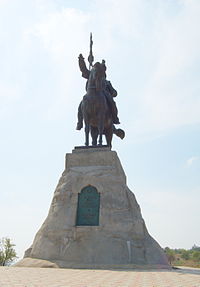Bulgarism
Appearance
You can help expand this article with text translated from the corresponding article in Russian. (January 2019) Click [show] for important translation instructions.
|

Bulgarism is an ideology aimed at the "revival of Bulgars' national identity" and Volga Bulgaria statehood.[2] It originated in the second half of 19th century within the Wäisi movement[3] and the Society for the study of the native land (Chuvashia)[4] It was revived at the end of the 20th century as "neobulgarism" in Tatarstan and Chuvashia.
The ideology is based on the theory that Volga Tatars and Chuvashs descend from Volga Bulgars. The theory was supported by the Soviet authorities in mid-20th century as an alternative to the "reactionary" theory claiming the Golden Horde descent.[5][6][7]
At the turn of XX—XXI centuries, the ideas of bulgarism had been revived through the activities of neobulgarists.
See also
References
- ^ "Памятник булгарскому эмиру Ибрагиму I бен Мухаммаду"
- ^ Татарская энциклопедия, Kazan, 2002, vol. 1, p. 490.
- ^ Усманова Д. М. Мусульманское «сектантство» в Российской империи: «Ваисовский Божий полк староверов-мусульман». 1862—1916 гг., Kazan. 2009, p. 3.
- ^ Денисов П. В., "Этнокультурные параллели дунайских болгар и чувашей", Чебоксары: Чуваш. кн. изд-во, 1969, p. 10
- ^ Schnirelmann, p. 24
- ^ Azade-Ayse Rorlich, "The Volga Tatars: A Profile in National Resilience", 1986, ISBN 0817983929, Chapter 1: "The Origins of Volga Tatars", p. 6
- ^ Victor Schnirelmann, "Who gets the past?: competition for ancestors among non-Russian intellectuals in Russia", Woodrow Wilson Center Press, 1996, ISBN 0-8018-5221-8, ISBN 978-0-8018-5221-3, Chapter 4: "The Rivalry for the Bulgar Legacy"
